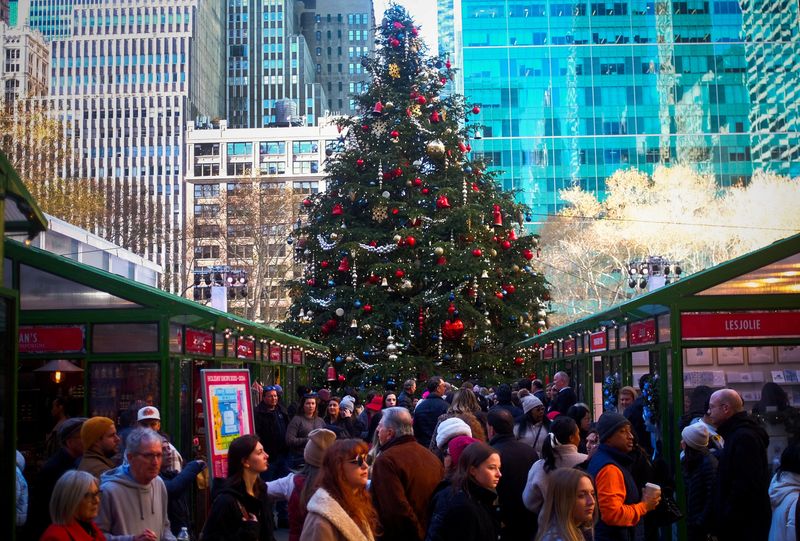US consumers see smaller inflation gains ahead, New York Fed says
2024.01.08 11:17

© Reuters. FILE PHOTO: Holiday shoppers pack the seasonal Bryant Park Winter Village beneath a large Christmas tree in midtown Manhattan, in New York City, U.S., December 15, 2023. REUTERS/Mike Segar/File Photo
By Michael S. Derby
(Reuters) – U.S. consumers’ projection of inflation over the short run fell to the lowest level in nearly three years in December, the New York Federal Reserve said in a report on Monday.
Inflation one year from now is expected to be at 3%, the lowest reading since January 2021, versus a projection of 3.4% in November, the regional Fed bank said in its latest Survey of Consumer Expectations. Poll respondents saw inflation three years from now at 2.6%, compared to 3% in November, while price pressures five years ahead were at 2.5% versus 2.7% in November.
The survey also found that respondents projected bigger increases for college costs in December relative to November, while expectations for food and rent increases fell. The expected year-ahead rise in gasoline prices held steady at 4.5% in December, with expectations for home price rises unchanged at 3%.
Ebbing inflation expectation readings bolster the broad consensus in financial markets and among U.S. central bank policymakers that inflation pressures will continue to retreat back toward the Fed’s 2% target. Fed officials generally believe that inflation expectations strongly influence what actual price pressures do, so the pullback in the December poll buttresses the view that real-world inflation will continue to moderate.
Cooling price pressures have allowed Fed officials to strongly suggest they are done with an aggressive campaign of interest rate hikes that began almost two years ago and accelerated after inflation peaked in the summer of 2022. At their Dec. 12-13 meeting, Fed policymakers even moved to pencil in rate cuts for 2024, with markets expecting a decent chance of an easing at the meeting March 19-20 meeting.
Respondents in the New York Fed poll also forecast slower gains in household earnings and spending, with the latter measure moving to 5% in December, its weakest reading since September 2021. Despite the softer turn, the New York Fed said expected spending gains for the final month of the year remain above the February 2020 pre-pandemic level of 3.1%.
The survey also found that consumers viewed access to credit as somewhat better, noting “expectations about credit access a year from now instead improved, with a larger share of respondents expecting looser credit conditions and a smaller share of respondents expecting tighter credit conditions a year from now.”
On balance, more households were upbeat about their financial situation in December and were more optimistic about conditions in the job market, the report said.








